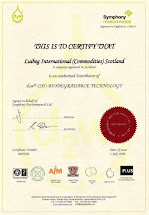
New ways to tackle plastics menace
Staff Reporter
Staff Reporter
India's approach to plastic needs to change, says expert
New methods:
Michael Stephen, technical director of d2W, demonstrating a new gadget at the workshop in Bangalore on Friday. — Photo: K. Murali Kumar
Amidst plans to rework the monitoring mechanism for the implementation of the Plastic (Manufacture, Sale and Usage) rules 1999, the Karnataka State Pollution Control Board (KSPCB) held a workshop to discuss various aspects of this legislation, and new technologies that can help reduce the impact of plastics.
Delivering the keynote address at the workshop, KSPCB Chairman A.S. Sadashivaiah said that a task force is being formed at the district-level to enforce this law that mandates the use of plastic with thickness more than 20 microns. However, he conceded that there are several “complications” even with this approach of tackling the plastic menace.
Mr. Sadashivaiah said: “We need to see what can be done to change our approach to plastics. Use of technology can make even thinner plastic degrade faster, so we need to look at a cost-effective and viable alternative to solving the plastic problem.” Out of the 3,500 tonnes of municipal solid waste generated in the city, plastic accounts for a substantial 110 tonnes, making its handling and management a critical issue.
‘Approach flawed'
Earlier, in a detailed presentation on various ways to tackle plastic, Michael Stephen, technical director of d2W, a company that deals with plastic technology, said that the decade-old rule that mandates a minimum thickness of 20 microns for plastic in India is “counter-intuitive to general discourse” on the same.
He pointed out that thinner plastic would require lesser fossil fuel and energy. “So it is strange that you should insist that what can be done at 10 or 15 micron must require more than 20 microns.”
Officials pointed out that the rationale behind this was to make it easier for ragpickers to segregate plastic, and to make recycling a more viable proposition. Mr. Stephen's presentation dealt with Oxo biodegradable plastics, a type of plastic to which small amounts of metal salt are added to catalyse or hasten the degradation process. He demonstrated the working of an X-Ray XRF Handgun, a gadget that helps determine the constituents of the plastic. OBDs have been used worldwide and we have not yet had any issues with toxicity or performance, he added.


